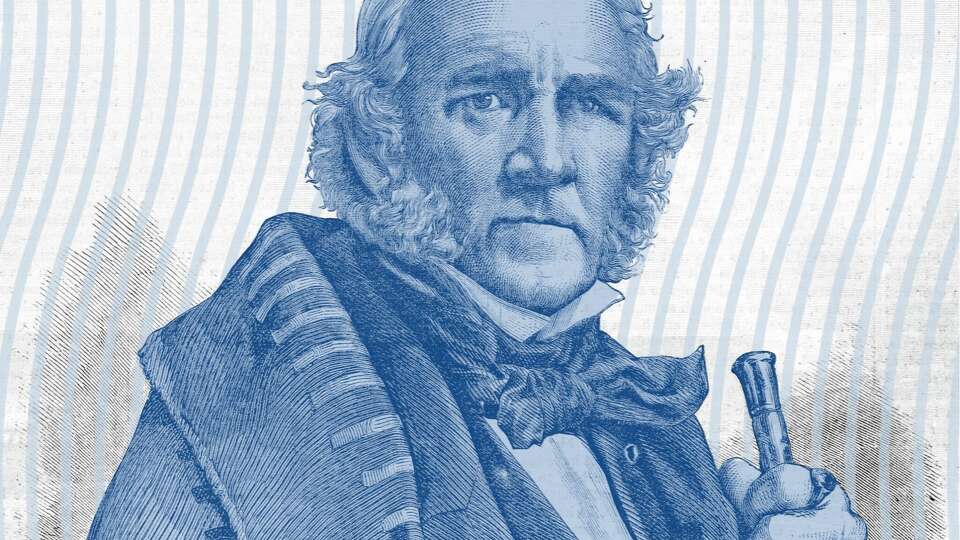June 21, 2024

Meet the drunken, brawling poet who gave Houston its name
Among American cities named for dead white men, Houston has the most colorful namesake. And more than 160 years after he died in Huntsville, Sam Houston looms large, literally, here.
A 67-foot statue of Houston by artist David Adickes hovers over the freeway near Huntsville and Sam Houston State University. Houston also has a highway, a park, a bridge, a library, a bunch of schools, a fort and a forest. And the Motor Vessel Sam Houston cruises through the Houston Ship Channel, a giant man-made trench that might be the feature most emblematic of Houston's stubborn grit.
Think about it: Houston's a city with multiple skylines, despite being built on marshy terrain. It's very blue. And it's very red. It's known for fast cars and slowed-down music. It is both dense and sprawling, unpretty and unforgiving, but wide open for a creation myth to take root.
The real Sam Houston was, in fact, a fascinating and flawed character who embodied many of the qualities that still make Houston, Houston today: ambition, reinvention and contradiction. For those interested in a deep dive, the late Marquis James' biography, "The Raven," is a brisk read. For those short on time, we offer a condensed biography into those themes.
Ambition
Like many of us, Houston wasn't from here. He was born in Virginia in 1793 and moved with his family to Tennessee as a teen. Seeking to avoid working in the family store, he ran away from home but didn't travel far, falling in with the Cherokee Nation. Chief Oo-loo-te-ka adopted him, giving him a name meaning "the Raven."
And as a young man, he made his name on the battlefield. He distinguished himself in combat — the Creek War and the Battle of 1812 — winning battles while also taking a bullet to the shoulder and an arrow to the crotch.
He parlayed this military career into a political one. Houston remains the only person in the history of this country to serve as governor of two states, Tennessee and Texas. He had more success in the latter than the former. Houston served as a congressman from Tennessee and then governor. He served as governor for less than two years, leaving office in scandal after his marriage mysteriously ended after 11 weeks. He hightailed it to Arkansas Territory and, eventually, Texas.
Reinvention
Tending to thwarted ambitions, a broken heart and a wounded groin, the Raven shook his feathers and started over, a recurring theme in his life. But Texas allowed Houston to be the most successful version of himself.
He perched in Texas in 1832 just as American settlers and the Mexican government feuded. Out of the chaos, he emerged as a legend: Houston created the Texas Army, and in 1836, he accepted the surrender of the Mexican forces after the Battle of San Jacinto, the crucial battle in the Texas Revolution. He became the president of the New Republic of Texas. Later, he'd serve as the state of Texas' governor.
Contradiction
Houston was a man who didn't exactly add up to an even number, and there are too many examples to tally up here.
He was pugnacious but with an affinity for poetry, particularly Homer. Houston was a peacock known for his flamboyant fashion, from velvet suits to bow ties as big as Texas. He also once brutally beat a U.S. Congressman.
He drank copiously.
His relationship with the Cherokee Nation was an odd one. As a teenager, he was welcomed by the Cherokee in Tennessee. Then in 1818, he negotiated the removal of the tribe from the state. When he fled Tennessee, he rejoined the Cherokee Nation in Arkansas.
Years later, he rallied against secession as the Texas governor during the Civil War. Houston was also a slave owner.
His pro-Union stance shut him out of the halls of power in Texas in 1861, and he died two years later.
Houston left behind his namesake.
So why was Houston named Houston?
A year after the Battle of San Jacinto in 1836, two huckster siblings bought a bunch of land in these parts for a buck an acre.
To curry favor with the new president of the Republic of Texas, they named their muddy dominion "Houston."
 | Andrew Dansby |
Ask Us Anything
What stumps you about Houston? Reply directly to this email with your questions.
Your questions, explained
Reader Question: I'm a 77-year-old native Houstonian. And, of course, a native Texan. I don't have a question about Houston, just a request . . . couldn't we please have real seasons? — Sylvia Lockett
I wish I had a better response for you, Sylvia. With a bit of twisting, I describe Houston as a four-season place: Mild, Early Summer, Mid-Summer and Please Make It Stop. I grew up in Kentucky, which had four distinct seasons, so getting acclimated to Houston is a work-in-progress spanning two decades and counting. I fear it'll get worse rather than better.
The average summer temperature here increased more than 4 degrees over the past half century, which is basically my life span. The best I have to offer you is company: You are not alone. And despite this shared distaste for the heat, during the summer months, I promise I won't stand too close to you.
Unsubscribe | Manage Preferences

Houston Chronicle
4747 Southwest Freeway, Houston, TX 77027
© 2024 Hearst Communications


No comments:
Post a Comment